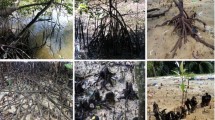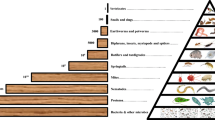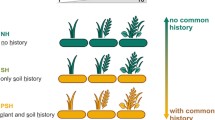Abstract
Recent investigations have increased our knowledge of the ecology of mangrove fungi. In this paper this information is reviewed with emphasis on biogeography, biodiversity, differences in the tropical and subtropical mycoflora, fungal distribution on mangroves trees, host specificity, vertical zonation and distribution with salinity. Gaps in our knowledge are discussed. There is little knowledge of the role of mangrove fungi in nutrient cycling which is also reviewed. Areas in which knowledge is deficient include quantification techniques for fungal abundance, the nature and activities of fungal extracellular enzymes and fungal modification of mangrove detritus matter, especially the dissolved form.
Similar content being viewed by others
References
Aleem, A. A., 1980. Distribution and ecology of marine fungi in Sierra Leone (Tropical West Africa). Bot. Mar. 23: 679–688.
Alias, A. & E. B. G. Jones, 1994. Biodiversity of fungi in tropical mangroves. In Fifth International Mycological Congress, Abstracts.
Bärlocher, F., S. Y. Newell & T. L. Arsuffi, 1989. Digestion of Spartina alterniflora Loisel material with and without fungal constituents by the periwinkle Littorina irrorata Say (Mollusca: Gastropoda). J. exp. mar. Biol. Ecol. 130: 45–53.
Blum, L. K., A. L. Mills, J. C. Zieman & R. T. Zieman, 1988. Abundance of bacteria and fungi in seagrass and mangrove detritus. Mar. Ecol. Prog. Ser. 42: 73–78.
Borse, B. D., 1988. Frequency of occurrence of marine fungi from Maharastra Coast, India. Indian J. Mar. Sci. 17: 165–167.
Boto, K. G., J. S. Bunt & J. T. Wellington, 1984. Variations in mangrove forest productivity in Northern Australia and Papua New Guinea. Estuarine, coastal and Shelf Science 19: 321–329.
Bunt, J. S., K. G. Boto & G. Boto, 1979. A survey method for estimating potential levels of mangrove forest primary production. Mar. Biol. 52: 123–128.
Camilleri, J. C. 1992. Leaf-litter processing by invertebrates in a mangrove forest in Queensland. Mar. Biol. 114: 139–145.
Carroll, G. C. & O. Petrini, 1983. Patterns of substrate utilization by some fungal endophytes from coniferous foliage. Mycologia 75: 53–63.
Chaloupka, J. & V. Krumphanzl, 1987. Extracellular enzymes of microorganisms. Plenum Press, New York. 216 pp.
Chinnaraj, S., 1993. Higher marine fungi from mangroves of Andaman and Nicobar Islands. Sydowia 45: 109–115.
Christensen, B., 1978. Biomass and primary productivity of Rhizophora apiculata Bl. mangrove in Southern Thailand. Aq. Bot. 4: 43–52.
Cundell, A. M., M. S. Brown, R. Stafford & R. Mitchell, 1979. Microbial degradation of Rhizophora mangle leaves immersed in the sea. Estuarine and Coastal Marine Science 9: 281–286.
Fell, J. W. & I. M. Master, 1973. Fungi associated with the degradation of mangrove (Rhizophora mangle L.) leaves in South Florida. In L. H. Stevenson & R. R. Colwell (eds), Estuarine Microbial Ecology. University of South Carolina Press, Columbia: 455–466.
Fell, J. W. & I. M. Master, 1980. The association and potential role of fungi in mangrove detrital systems. Bot. Mar. 23: 257–263.
George, A. S. & K. F. Kenneally, 1975. The flora of the Prince Regent river reserve, north-western Kimberley, Western Australia: A biological survey of the Prince Regent river reserve, North-West Kimberley, Western Australia in August, 1974. Widl. Res. Bull. West. Aust. 3: 1–116.
Graça, M. A. S., L. Maltby & P. Calow, 1993. Importance of fungi in the diet of Gammarus pulex and Asellus aquaticus I: feeding strategies. Oecologia 93: 139–144.
Heald, E. J. 1971. The production of organic detritus in a South Florida estuary. University of Miami Sea Grant Technical Bulletin. No. 6.
Hughes, G. C. 1974. Geographical distribution of the higher marine fungi. Veröff. Inst. Meeresforsch. Bremenh. Suppl. 5: 419–441.
Hutchings, P. & P. Saenger, 1987. Ecology of mangroves. University of Queensland Press, St. Lucia.
Hyde, K. D., 1986. Frequency of occurrence of lignicolous marine fungi in the tropics. In S. T. Moss (ed), The Biology of Marine Fungi. Cambridge University Press, Cambridge: 311–322.
Hyde, K. D., 1988a. Studies on the tropical marine fungi of Brunei. Bot. J. Linn. Soc. 98: 135–51.
Hyde, K. D., 1988b. Observations on the vertical distribution of marine fungi on Rhizophora spp., at Kampong Danau mangrove, Brunei. Asian Mar. Biol. 5: 77–81.
Hyde, K. D., 1988c. Studies on the tropical marine fungi of Brunei II. Notes on five interesting species. Trans. Mycol. Soc. Japan 29: 161–171.
Hyde, K. D., 1988d. The genus Linocarpon from the mangrove palm Nypa fruticans. Trans. Mycol. Soc. Japan 29: 339–350.
Hyde, K. D., 1989a. Ecology of tropical marine fungi. Hydrobiologia 178: 199–208.
Hyde, K. D., 1989b. Intertidal mangrove fungi from North Sumatra. Can. J. Bot. 67: 3078–3082.
Hyde, K. D., 1989c. Vertical zonation of intertidal mangrove fungi. In T. Hattori, Y. Ishida, R. Maryama, R. Mortia & A. Uchida (eds), Recent Advances in Microbial Ecology. Japan Scientific Societies Press, Tokyo: 302–306.
Hyde, K. D., 1990a. A comparison of the intertidal mycota of five mangrove tree species. Asian Mar. Biol. 7: 93–107.
Hyde, K. D., 1990b. Caryospora mangrovei sp. nov. and notes on marine fungi from Thailand. Trans. Mycol. Soc. Japan 30: 333–342.
Hyde, K. D., 1990c. A study of the vertical zonation of intertidal fungi on Rhizophora apiculata at Kampong Kapok Mangrove, Brunei. Aq. Bot. 36: 255–62.
Hyde, K. D., 1990d. Intertidal fungi from warm temperate mangroves of Australia, including Tunicatispora australiensis gen. et sp. nov. Aust. Syst. Bot. 3: 711–718.
Hyde, K. D., 1991a. A new Amphisphaeriaceous fungus from intertidal fronds of Nypa fruticans. Trans. Mycol. Soc.Japan 31: 265–271.
Hyde, K. D., 1991b. Fungal colonization of Rhizophora apiculata and Xylocarpus granatum poles in Kampong Kapok mangrove, Brunei. Sydowia 43: 31–38.
Hyde, K. D., 1992a. Julella avicenniae Borse comb. nov. (Thelenellaceae) from intertidal mangrove wood and miscellaneous fungi form the NE coast of Queensland. Mycol. Res. 96: 939–942.
Hyde, K. D., 1992b. Fungi from Nypa fruticans: Nipicola carbospora gen. et sp. nov. (Ascomycotina) Crypt. Bot. 2: 330–332.
Hyde, K. D., 1992c. Fungi from decaying intertidal fronds of Nypa fruticans, including three new genera and four new species. Bot. J. Linn. Soc. 110: 95–110.
Hyde, K. D., 1992d. Intertidal fungi from Kandelia candel including Phomatospora kandelii sp. nov. Trans. Mycol. Soc. Japan 33: 313–316.
Hyde, K. D., 1992e. Intertidal mangrove fungi from the west coast of Mexico, including one new genus and two new species. Mycol. Res. 96: 25–30.
Hyde, K. D., 1993. Fungi from palms. V. Phomatospora nypae and notes on intertidal fungi from Nypa fruticans in Malaysia. Sydowia 45: 199–203.
Hyde, K. D. & E. B. G. Jones, 1988. Marine mangrove fungi. Mar. Ecol. (Berlin) 9: 15–33.
Hyde, K. D. & E. B. G. Jones, 1989. Ecological observations on marine fungi from the Seychelles. Bot. J. Linn. Soc. 100: 237–254.
Hyde, K. D. & A. Nakagiri, 1989. A new species of Oxydothis from the mangrove palm, Nypa fruticans. Trans. Mycol. Soc. Japan 30: 69–76.
Hyde, K. D. & B. C. Sutton, 1992. Nypaella frondicola gen. et sp. nov., Plectophomella nypae sp. nov. and Pleurophomopsis nypae sp. nov (Coelomycetes) from intertidal frons of Nypa fruticans. Mycol. Res. 96: 210–214.
Hyde, K. D., A. Chalermpongse & T. Boonthavikoon, 1990. Ecology of intertidal fungi at Ranong mangrove, Thailand. Trans. Mycol. Soc. Japan 31: 17–28.
Hyde, K. D., A. Chalermpongse & T. Boonthavikoon, 1993. The distribution of intertidal fungi on Rhizophora apiculata. In: B. Morton (ed), The Marine Biology of the South China Sea. Proceedings of the First International Conference on the Marine Biology of Hong Kong and the South China Sea, Hong Kong 1990. University of Hong Kong Press, Hong Kong: 643–652.
Jones, E. B. G. 1993. Tropical marine fungi. In S. Isaac, J. C. Frankland, R. Watling & J. S. Whatley (eds.), Aspects of Tropical Mycology. Cambridge University Press, Cambridge: 73–89.
Jones, E. B. G. & K. D. Hyde, 1990. Observations on poorly known mangrove fungi and nomenclatural correction. Mycotaxon 37: 197–201.
Jones, E. B. G. & A. J. Kuthubutheen, 1989. Malaysian Mangrove Fungi. Sydowia 41: 160–169.
Jones, E. B. G. & T. K. Tan, 1987. Observations on manglicolous fungi from Malaysia. Trans. Brit. Mycol. Soc. 89: 390–392.
Jones, E. B. G., F. R. Uyenco & M. P. Foliosco, 1988. Fungi on driftwood collected in the intertidal zone from the Philippines. Asian Mar. Biol. 5: 103–106.
Kohlmeyer, J., 1980. Tropical and subtropical filamentous fungi of the Western Atlantic Ocean. Bot. Mar. 23: 529–544.
Kohlmeyer, J., 1981. Marine fungi from Martinique. Can. J. Bot. 59: 1314–1321.
Kohlmeyer, J., 1983. Geography of marine fungi. Aust. J. Bot. Suppl. Ser. 10: 67–76.
Kohlmeyer, J., 1984. Tropical marine fungi. Mar. Ecol. (Berlin) 5: 329–378.
Kohlmeyer, J. & E. Kohlmeyer, 1979. Marine Mycology. The Higher Fungi. Academic Press, New York.
Kohlmeyer, J. & B. Volkmann-Kohlmeyer, 1987a. Marine fungi from Aidabra, the Galapagos, and other tropical islands. Can. J. Bot. 65: 571–582.
Kohlmeyer, J. & B. Volkmann-Kohlmeyer, 1987b. Marine fungi from Belize with a description of two new genera of ascomycetes. Bot. Mar. 30: 195–204.
Kohlmeyer, J. & B. Volkmann-Kohlmeyer, 1988. Ophiodeira gen. nov. (Halosphaeriales) and a survey of higher marine fungi from Saint Croix (Virgin Islands). Can. J. Bot. 66: 2062–2067.
Kohlmeyer, J. & B. Volkmann-Kohlmeyer, 1991. Marine fungi from Queensland, Australia. Aust. J. Mar. Freshw. Res. 42: 91–99.
Kohlmeyer, J. & B. Volkmann-Kohlmeyer, 1993a. Two new genera of Ascomycotina from saltmarsh Juncus. Systema Ascomycemm 11: 95–106.
Kohlmeyer, J. & B. Volkmann-Kohlmeyer, 1993b. Biogeographic observations on Pacific marine fungi. Mycologia 85: 337–346.
Lee, S. Y., 1989. The importance of Sesarminae crabs Chiromanthes spp. and inundation frequency on the decomposition of mangrove (Kandelia candel (L.) Druce) leaf litter in a Hong Kong tidal shrimp pond. J. exp. mar. Biol. Ecol. 131: 23–43.
Lee, S. Y. 1993. Leaf choice of the sesarmine crabs Chiromanthes bidens and C. maipoensis in a Hong Kong mangal. In B. Morton, (ed.), Marine Biology of the South China Sea: Proceedings of the First International Conference on the Marine Biology of Hong Kong and the South China Sea, Hong Kong, 1990. Hong Kong University Press, Hong Kong: 597–604.
Leong, W. F., T. K. Tan & E. B. G. Jones, 1991. Fungal colonization of submerged Bruguiera cylindrica and Rhizophora apiculata wood. Bot. Mar. 34: 69–76.
Nakagiri, A., 1993. Intertidal mangrove fungi from Iriomote Island. IFO Res. Commun. 16: 24–62.
Nakagiri, A., S. Tokumasu, H. Araki et al. 1989. Succession of fungi in decomposing mangrove leaves in Japan. Proc. Int. Symp. Micro. Ecol. 5: 297–301.
Newell, S. Y. 1984. Bacterial and fungal productivity in the marine environment: a contrastive overview. Colloques Int. Cent. Natn. Rech. Scient. 331: 133–139.
Newell, S. Y. 1986. Mangrove fungi: the succession in the mycoflora of red mangrove (Rhizophora mangle) seedlings. In E. B. G. Jones (ed), Recent Advances in Aquatic Mycology. Elek Science: 5: 1–91.
Newell, S. Y. 1992. Estimating fungal biomass and productivity in decomposing litter. In G. C. Carroll, & D. T. Wicklow (eds), The fungal community. Its organization and role in the ecosystem. Marcel Dekker, Inc., New York: 521–561.
Newell, S. Y., R. D. Fallon & J. D. Miller, 1986. Measuring fungal-biomass dynamics in standing-dead leaves of a salt-marsh vascular plant. In S. T. Moss, (ed), Biology of Marine Fungi, Cambridge University Press, Cambridge: 19–25.
Newell, S. Y. & J. W. Fell, 1992. Ergosterol content of living and submerged, decaying leaves and twigs of red mangrove. Can. J. Microbiol. 38: 979–982.
Newell, S. Y., J. D. Miller & J. W. Fell, 1987. Rapid and pervasive occupation of fallen mangrove leaves by a marine zoosporic fungus. Appl. Environ. Microbiol. 53: 2464–2469.
Newell, S. Y. & A. Statzell-Tallman, 1982. Factors for conversion of fungal biovolume to biomass, carbon and nitrogen: variation with mycelial ages, growth conditions, and strains of fungi from a salt marsh. Oikos 39: 261–268.
Odum, W. E. & E. J. Heald, 1975. The detritus food web of an estuarine mangrove community. In L. E. Cronin (ed), Estuarine Research. Vol. I. Academic Press, New York: 265–286.
Poovichiranon, S., K. G. Boto & N. C. Duke, 1986. Food preference studies and ingestion rate measurements of the mangrove amphipod Parhyale hawaiensis (Dana). J. exp. mar. Biol. Ecol. 98: 129–140.
Robertson, A. I., 1986. Leaf-burying crabs: their influence on energy flow and export from mixed mangrove forests (Rhizophora spp.) in northeastern Australia. J. exp. mar. Biol. Ecol. 102: 237–248.
Robertson, A. I., 1987. The determination of tropic relationships in mangrove dominated systems: areas of darkness. In C. D. Field & A. J. Dartnall (eds), Mangrove ecosystems of Asia and the Pacific: status, exploitation and management. Australian Institute of Marine Science, Australia: 292–304.
Robertson, A. I. & P. A. Daniel, 1989. The influence of crabs on litter processing in high intertidal mangrove forests in tropical Australia. Oecologia 78: 191–198.
Robertson, A. I., D. M. Alongi & K. G. Boto, 1992. Food chains and carbon fluxes. In A. I. Robertson & D. M. Alongi (eds), Tropical Mangrove Ecosystems. American Geophysical Union, Washington D.C.: 293–326.
Saenger, P. & S. C. Snedaker, 1993. Pantropical trends in mangrove above-ground biomass and annual litter fall. Oecologia 96: 293–299.
Stolp, H., 1988. Microbial ecology: organisms, habitats, activities. Cambridge University Press, Cambridge. 308 pp.
Tan, T. K., W. F. Leong & E. B. G. 1989. Succession of fungi on wood of Avicennia alba and A. lanata in Singapore. Can. J. Bot. 67: 2686–2691.
Tenore, K. R., J. C. Cammen, S. E. G. Findlay & N. Phillips, 1982. Perspectives of research of detritus: do factors controlling the availability of detritus to macroconsumers depend on this source? J. Mar. Res. 40: 473–490.
Tomlinson, P. B. 1986. The botany of mangroves. Cambridge University Press, Cambridge. 413 pp.
Vrijmoed, L. L. P. 1990. Preliminary observations of lignicolous marine fungi from mangroves in Hong Kong. In B. Morton (ed), Proceedings of the Second International Marine Biological Workshop: the marine flora and fauna of Hong Kong and southern China, Hong Kong, 1986, Hong Kong University Press, Hong Kong: 701–706.
Vrijmoed, L. L. P., K. D. Hyde & E. B. G. Jones, 1994. Diaporthe salsuginea sp. nov. and Aniptodera sp. nov. from Hong Kong and Macau mangroves. Mycol. Res. 96: 699–704.
Wetzel, R. G., 1984. Detrital dissolved and particulate organic carbon functions in aquatic ecosystems. Bull. mar. Sci. 35: 503–509.
Wu, R. Y., 1993. Studies on the microbial ecology of the Tansui Estuary. Bot. Bull. Acad. Sin. 34: 13–30.
Author information
Authors and Affiliations
Rights and permissions
About this article
Cite this article
Hyde, K.D., Lee, S.Y. Ecology of mangrove fungi and their role in nutrient cycling: what gaps occur in our knowledge?. Hydrobiologia 295, 107–118 (1995). https://doi.org/10.1007/BF00029117
Issue Date:
DOI: https://doi.org/10.1007/BF00029117




